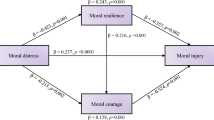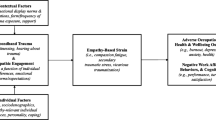Victims of disaster: can ethical debriefings be of help to care for their suffering?
‘La douleur existe, elle est injustifiable’ (Jean-Luc Nancy).
Abstract
Victims of disaster suffer, not only at the very moment of the disaster, but also years after the disaster has taken place, they are still in an emotional journey. While many moral perspectives focus on the moment of the disaster itself, a lot of work is to be done years after the disaster. How do people go through their suffering and how can we take care of them? Research on human suffering after a major catastrophe, using an ethics of care perspective, is scarce. People suffering from disasters are often called to be in distress and their emotional difficulties ‘medicalised’. This brings them often into a situation of long term use of medication, and one can wonder if medication is of help to them in the long run. In our paper, we will explore another moral perspective, focusing on the importance of the victims’ narrative and their lived experiences. We will use Paul Ricoeur’s phenomenological reflections from ‘Suffering is not the same as pain’ for conceptualizing human suffering and how to apply it to victims of disaster. Ricoeur suggests that suffering is not a quantity that can be measured, but a characteristic that should be studied qualitatively in interpersonal and narrative contexts. Above all, the perspective of care and listening could offer an opportunity to reconcile people from their loss and suffering.

Similar content being viewed by others
References
APA. 2013. Diagnostic and statistical manual of mental disorders—Fifth Edition—DSM-5. Washington DC: American Psychiatric Association.
Bistoen, G., S. Vanheule, and S. Craps. 2014. Nachträglichkeit: A freudian perspective on delayed traumatic reactions. Theory & Psychology 24(5): 668–687.
Bruner, J. 1990. Acts of meaning. Cambridge: Harvard University Press.
Canguilhem, G. 1991. The normal and the pathological. New York: Zone Books.
Carel, H. 2012. Phenomenology as a resource for patients. Journal of Medicine and Philosophy 37(2): 96–113.
Carel, H., and J. Macnaughton. 2012. “How do you feel?”: Oscillating perspectives in the clinic. The Lancet 379(9834): 2334–2335.
Caruth, C. 1996. Unclaimed experience: Trauma, narrative, and history. Baltimore (Md.): Johns Hopkins University Press.
Caruth, C. 2004. Trauma: Explorations in memory. Baltimore (Md.): Johns Hopkins University Press.
Caruth, C.A. 2014. Listening to trauma: Conversations with leaders in the theory and treatment of catastrophic experience. Baltimore: The Johns Hopkins University Press.
Cassel, E.J. 1982. The nature of suffering and the goals of medicine. New England Journal of Medicine 306(11): 639–645. doi:10.1056/NEJM198203183061104.
Cassell, E.J. 1991. The nature of suffering and the goals of medicine. Oxford: Oxford University Press.
Charalambous, A., R. Papadopoulos, and A. Beadsmoore. 2008. Ricoeur’s hermeneutic phenomenology: An implication for nursing research. Scandinavian Journal of Caring Sciences 22(4): 637–642. doi:10.1111/j.1471-6712.2007.00566.x.
Charon, R. 2008. Narrative medicine: Honoring the stories of illness. Oxford: Oxford University Press.
Charon, R., and M. Montello. 2002. Stories matter: The role of narrative in medical ethics. New York (N.Y.): Routledge.
Cohen, R.E. 2002. Mental health services for victims of disasters. World Psychiatry 1(3): 149–152.
Crocq, L. 2002. Special teams for medical/psychological intervention in disaster victims. World Psychiatry 1(3): 154–155.
Dreyer, P.S., and B.D. Pedersen. 2009. Distanciation in Ricoeur’s theory of interpretation: Narrations in a study of life experiences of living with chronic illness and home mechanical ventilation. Nursing Inquiry 16(1): 64–73. doi:10.1111/j.1440-1800.2009.00433.x.
Dyregrov, A. 1997. The process in psychological debriefings. Journal of Traumatic Stress 10(4): 589–605. doi:10.1002/jts.2490100406.
Forsberg, R., and B.-I. Saveman. 2011. Survivors’ experiences from a train crash. International Journal of Qualitative Studies on Health and Well-being. doi:10.3402/qhw.v6i4.8401.
Frank, A.W. 2004. The renewal of generosity: Illness, medicine, and how to live. Chicago (Ill.): University of Chicago press.
Frank, A.W.A. 2013. The wounded storyteller: Body, illness, and ethics. Chicago: The University of Chicago Press.
Fredriksson, L., and K. Eriksson. 2001. The patient’s narrative of suffering: A path to health? Scandinavian Journal of Caring Sciences 15(1): 3–11. doi:10.1046/j.1471-6712.2001.1510003.x.
Freeman, J.C., D. Epston, and D. Lobovits. 1997. Playfull approaches to serious problems: Narrative therapy with children and their families. New York (N.Y.): Norton.
Gale, D.D., A.M. Mitchell, L. Garand, and S. Wesner. 2003. Client narratives: A theoretical perspective. Issues in Mental Health Nursing 24(1): 81–89.
Geanellos, R. 2000. Exploring Ricoeur’s hermeneutic theory of interpretation as a method of analysing research texts. Nursing Inquiry 7(2): 112–119.
Gist, R., and G.J. Devilly. 2002. Post-trauma debriefing: The road too frequently travelled. The Lancet 360(9335): 741–742. doi:10.1016/S0140-6736(02)09947-6.
HCN. (2006). The medium and long-term health impact of disasters. http://www.gezondheidsraad.nl/sites/default/files/200618E_0.pdf: Health Council of the Netherlands.
Heir, T., and L. Weisaeth. 2006. Back to where it happened: Self-reported symptom improvement of tsunami survivors who returned to the disaster area. Prehospital and Disaster Medicine 21(2): 59–63.
Hunt, M.R., L. Schwartz, and L. Elit. 2012. Experience of ethics training and support for health care professionals in international aid work. Public Health Ethics 5(1): 91–99.
Isovaara, S., M. Arman, and A. Rehnsfeldt. 2006. Family suffering related to war experiences: An interpretative synopsis review of the literature from a caring science perspective. Scandinavian Journal of Caring Sciences 20(3): 241–250. doi:10.1111/j.1471-6712.2006.00432.x.
Johannesson, K.B., T. Lundin, T. Frojd, C.M. Hultman, and P.O. Michel. 2011. Tsunami-exposed tourist survivors: Signs of recovery in a 3-year perspective. The Journal of Nervous and Mental Disease 199(3): 162–169. doi:10.1097/NMD.0b013e31820c73d1.
Jones, A.H. 1997a. Literature and medicine: Narrative ethics. The Lancet 349(9060): 1243–1246.
Jones, A.H. 1997b. Literature and medicine; narratives of mental illness. The Lancet 350(9074): 359–361.
Kargillis, C., M. Kako, and D. Gillham. 2014. Disaster survivors: A narrative approach towards emotional recovery. Australian Journal of Emergency Management 29(2): 25–30.
Lauritzen, P., and D.F. Cates. 2001. Medicine and the ethics of care. Washington: Georgetown University Press.
López-Ibor, J.J., G. Christodoulou, M. Maj, N. Sartorius, and A. Okasha. 2004. Disasters and mental health. Chichester: Wiley.
Marshall, P.A., and J.P. O’Keefe. 1995. Medical students’ first-person narratives of a patients story of AIDS. Social Science and Medicine 40(1): 67–76.
McKinney, A.A., and P. Deeny. 2002. Leaving the intensive care unit: A phenomenological study of the patients’ experience. Intensive & Critical Care Nursing 18(6): 320–331. doi:10.1016/S0964-3397(02)00069-1.
McNally, R.J., R.A. Bryant, and A. Ehlers. 2003. Does early psychological intervention promote recovery from posttraumatic stress? Psychological Science in the Public Interest 4(2): 45–79. doi:10.1111/1529-1006.01421.
Molloy, J., M. Evans, and K. Coughlin. 2015. Moral distress in the resuscitation of extremely premature infants. Nursing Ethics 22(1): 52–63.
Morris, D.B. 2001. Narrative, ethics, and pain: Thinking with stories. Narrative 9(1): 55–77.
Morse, J.M. 2003. Toward a praxis theory of suffering. Advances in Nursing Science 26(1): 3. author reply 3–4.
Newton, A.Z. 1997. Narrative ethics. Cambridge: Harvard University Press.
Ozge Karadag, C., and A. Kerim Hakan. 2012. Ethical dilemmas in disaster medicine. Iranian Red Crescent Medical Journal 14(10): 602–612.
Paulsen, J.E. 2011. A narrative ethics of care. Health Care Analysis 19(1): 28–40. doi:10.1007/s10728-010-0162-8.
Råholm, M.-B., M. Arman, and A. Rehnsfeldt. 2008. The immediate lived experience of the 2004 tsunami disaster by Swedish tourists. Journal of Advanced Nursing 63(6): 597–606. doi:10.1111/j.1365-2648.2008.04734.x.
Råholm, M.-B., and L. Lindholm. 1999. Being in the world of the suffering patient: A challenge to nursing ethics. Nursing Ethics 6(6): 528–539.
Raholm, M.B. 2008. Uncovering the ethics of suffering using a narrative approach. Nursing Ethics 15(1): 62–72. doi:10.1177/0969733007083935.
Rehnsfeldt, A., and K. Eriksson. 2004. The progression of suffering implies alleviated suffering. Scandinavian Journal of Caring Sciences 18(3): 264–272. doi:10.1111/j.1471-6712.2004.00281.x.
Ricoeur, P. 2013. La souffrance n’est pas la douleur. In Souffrance et douleur, ed. C. Marin, and N. Zaccaï-Reyners, 13–33. Paris: Presses Universitaires de France.
Roxberg, A., J. Sameby, S. Brodin, B. Fridlund, and A.B. da Silva. 2010. Out of the wave: The meaning of suffering and relief from suffering as described in autobiographies by survivors of the 2004 Indian Ocean tsunami. International Journal of Qualitative Studies on Health and Well-being. doi:10.3402/qhw.v5i3.5323.
Santiago, C.M.N.R.N.C., and S.P.H.D.M.A.B.A.R.N. Abdool. 2011. Conversations about challenging end-of-life cases: Ethics debriefing in the medical surgical intensive care unit. Dynamics The Official Journal of the Canadian Association of Nurses 22(4): 26–30.
Scarry, E. 1985. The body in pain: The making and unmaking of the world. New York (N.Y.): Oxford University Press.
Stayt, L.C., K. Seers, and L. Tutton. 2016. Making sense of it: Intensive care patients’ phenomenological accounts of story construction. Nursing in Critical Care 21(4): 225–232. doi:10.1111/nicc.12224.
Stern, S., M. Doolan, E. Staples, G.L. Szmukler, and I. Eisler. 1999. Disruption and reconstruction: Narrative insights into the experience of family members caring for a relative diagnosed with serious mental illness. Family Process 38(3): 353–369.
Stuhlmiller, C.M. 1994. Narrative methodology in disaster studies Rescuers of Cypress. In Interpretive phenomenology: Embodiment, caring, and ethics in health and illness, ed. P. Benner, 255–278. California: SAGE Publications.
Svandra, P. 2012. Pain and suffering, in the footsteps of Paul Ricoeur. Soins Psychiatr 282: 12–15.
van Emmerik, A.A., J.H. Kamphuis, A.M. Hulsbosch, and P.M. Emmelkamp. 2002. Single session debriefing after psychological trauma: A meta-analysis. The Lancet 360(9335): 766–771. doi:10.1016/s0140-6736(02)09897-5.
van Nistelrooij, I., P. Schaafsma, and J.C. Tronto. 2014. Ricoeur and the ethics of care. Medicine, Health Care and Philosophy 17(4): 485–491. doi:10.1007/s11019-014-9595-4.
Vanheule, S., and I. Devisch. 2014. Mental suffering and the DSM-5: A critical review. Journal of Evaluation in Clinical Practice 20(6): 975–980.
Walters, A.J. 1995. The phenomenological movement: Implications for nursing research. Journal of Advanced Nursing 22(4): 791–799. doi:10.1046/j.1365-2648.1995.22040791.x.
Wessely, S., and M. Deahl. 2003. Psychological debriefing is a waste of time. The British Journal of Psychiatry 183(1): 12–14.
Williams, S.L. 2010. How telling stories helps patients to recover psychologically after intensive care. Nursing Times 106(5): 20–23.
Author information
Authors and Affiliations
Corresponding author
Rights and permissions
About this article
Cite this article
Devisch, I., Vanheule, S., Deveugele, M. et al. Victims of disaster: can ethical debriefings be of help to care for their suffering?. Med Health Care and Philos 20, 257–267 (2017). https://doi.org/10.1007/s11019-016-9742-1
Published:
Issue Date:
DOI: https://doi.org/10.1007/s11019-016-9742-1




